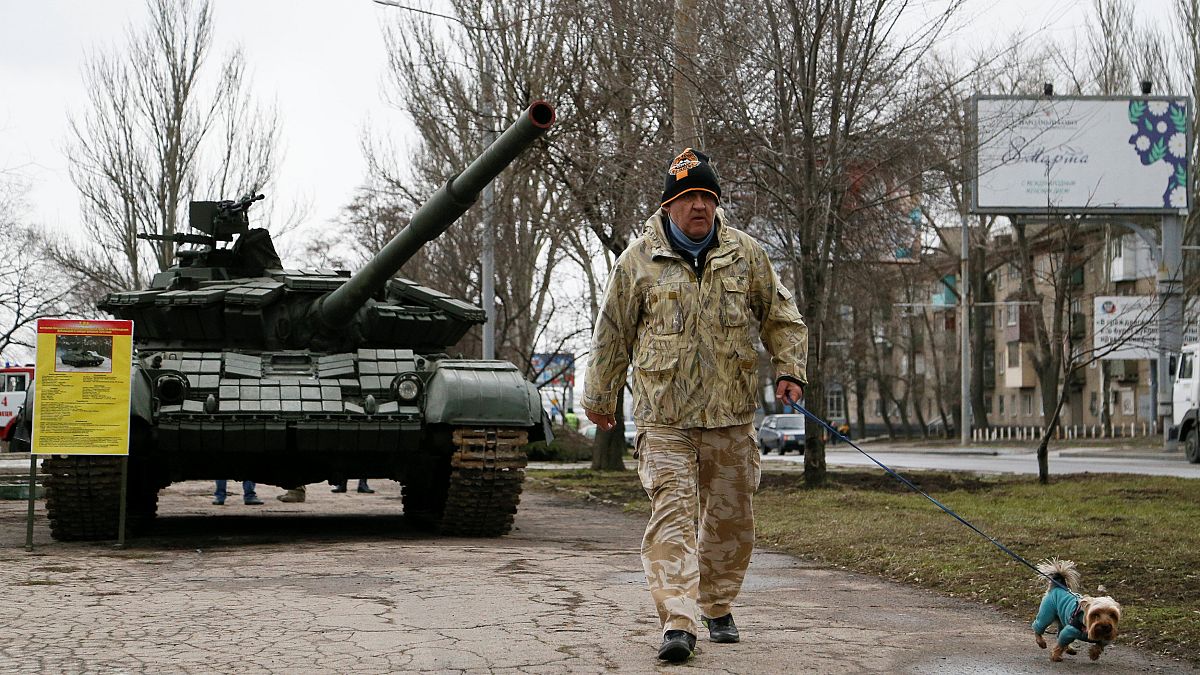Vladimir Putin said he saw "nothing wrong" with easing the path to Russian citizenship for residents of separatist-controlled eastern Ukraine after the European Union condemned the move.
President Vladimir Putin said there was nothing wrong with making it easier for residents of eastern Ukraine to get Russian passports.
The move, which comes days after Ukraine elected a new president, has been condemned by the European Union (EU).
Speaking to reporters after his summit with North Korean leader Kim Jong Un, Putin called attention to the fact that Poland, Romania, and Hungary granted citizenship to their ethnic kin outside of their borders, adding he saw no reason for Russia to not do the same.
"It caused a negative reaction. That's strange," said Putin. "How are Russians in Ukraine worse than Romanians, Poles or Hungarians? I don't see anything unusual here."
Under the new regulation, residents from eastern Ukraine will get passports within three months. Until now, they were required to have lived in Russia for five years before applying and undergo citizenship tests.
Moscow's move comes as an early test for the Ukrainian president-elect Volodymyr Zelenskiy. The former comedian won a landslide victory in Sunday's presidential election and has pledged to find a peaceful solution to the conflict.
Read more: Ukraine enters the unknown as comedian Zelenskiy wins election by a landslide
The EU condemned Putin's move on Thursday, accusing Russia of attacking Ukraine's sovereignty
Putin's decisions "shows Russia's intention to further destabilise Ukraine and to exacerbate the conflict," said the European Union in a statement.
The EU also reminded Putin to comply with the Minsk agreements — a deal to halt the war in eastern Ukraine signed by Ukraine, Russia, the Donetsk People's Republic and the Luhansk People's Republic in 2014.
"We expect Russia to refrain from actions that are against the Minsk agreements and impede the full reintegration of the non-Government controlled areas into Ukraine," said the EU statement.
"The European Union remains steadfast in its support to Ukraine's independence, sovereignty and territorial integrity."
The German Foreign Office said that Germany and France also condemned Putin's decree, adding that these regions are part of Ukraine's national territory.
"The announcement of Russia contradicts the spirit and goals of the Minsk agreements. This is the opposite of the now urgently needed contribution to de-escalation," said the tweet.
President-elect decries "aggressor state"
Zelenskiy strongly condemned Moscow's decision in a statement: "These actions are yet another evident confirmation for the world community of Russia's true role as an aggressor state, which is waging a war against Ukraine.
"Unfortunately, this decree does not bring us closer to the ultimate goal of peace," the President-elect continued.
He also called for the international community to threaten Russia with more sanctions.
Outgoing President Petro Poroshenko said Russia might try to annex the Donbass region. He urged Ukraine's allies "to prevent the worst scenario, to severely condemn the destructive and criminal actions of the Russian authorities and to strengthen the regime of international sanctions".
Ukraine Foreign Minister Pavlo Klimkin denounced the move on Twitter as a "continuation of aggression and interference in our internal affairs", urging Ukrainians living under occupation not to apply for Russian passports.
Ukraine said it had informed the United Nations about Russia's move and also asked the EU to take "prompt and decisive" action.
The United States called Putin's action "absurd and destabilising".
Meanwhile, Putin justified the move on human rights grounds. "We have no desire to create problems for the new Ukrainian leadership, but to tolerate a situation in which people living in the territory of Donetsk and Luhansk republic are generally deprived of any civil rights, this is already crossing the line from the point of view of human rights," he said.
But Mathieu Boulegue, an expert on Ukraine from the Chatham House think tank, called the move "Passeportisation" and said it was a classic tool of Russian subversive foreign policy.
"It’s a classic tool aimed at making the reappropriation of occupied territories much harder for Ukraine," he told Euronews. "The same method was used with Abkhazia and South Ossetia."
Five years of war in eastern Ukraine
Five years of war between Ukrainian troops and Russian-backed forces have killed 13,000 people despite a notional ceasefire signed in 2015.
Rebellions broke out against Ukrainian government rule in the Donetsk and Luhansk regions in 2014.
Swathes of the two regions are now under the de facto control of the Moscow-backed rebels, while Kiev says it is determined to re-assert its control, a position backed by most Western countries.
Oleksandr Turchynov, the secretary of Ukraine's national security council, said Russia's move was intended to give Moscow legal cover for deploying its troops to eastern Ukraine on the pretext of protecting Russian citizens.
Russia has consistently denied Western and Ukrainian accusations that it sends troops and heavy weapons to fight Ukrainian forces in the region.
The United States, the European Union and Russia will be closely watching Zelenskiy's foreign policy pronouncements to see if and how he might try to end the conflict.
Immediately after Zelenskiy's victory, the Kremlin had said it was premature to talk of Putin congratulating Zelenskiy or the possibility of the two leaders working together.
Zelenskiy has pledged to keep Ukraine on a pro-Western course while sounding less emphatic than his predecessor President Petro Poroshenko about possible plans for the country of 42 million people to one day join the EU or NATO.
